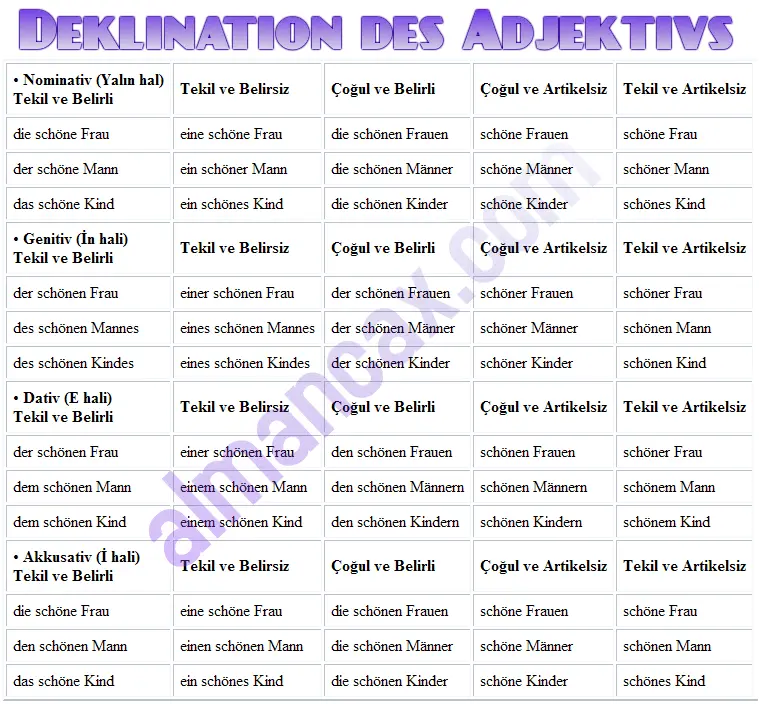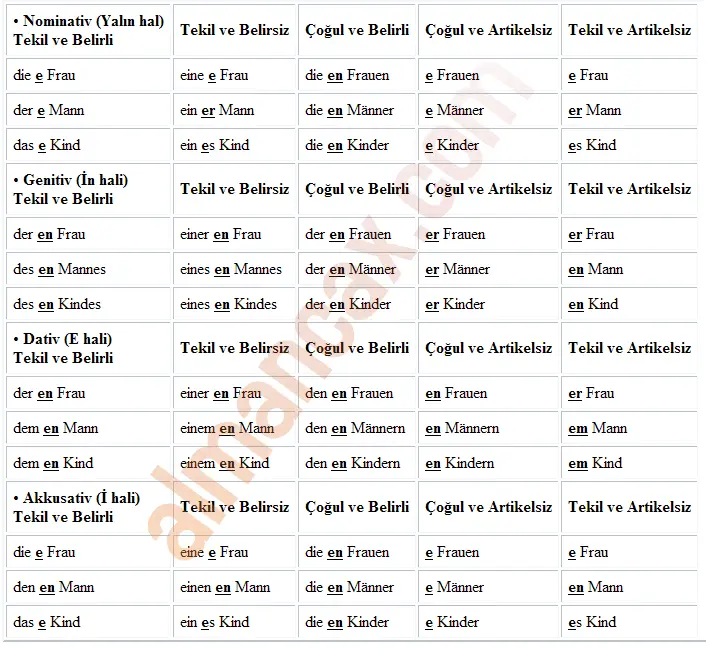German Attractiveness of adjectives according to their case (Deklination des Adjektivs)

DRUG FROM GERMAN ADJECTS
DRAMA OF GERMAN ADJECTIONS ACCORDING TO THE NAME OF THE WORLD
In the previous lesson, we examined the subject of adjective clauses and gave examples of adjective clauses for nouns in plain form. However, we have stated that the suffixes taken by adjectives vary according to the state of the noun, the article and the singular-plural.
In this lesson, we will examine the suffixes of adjectives for all of these states where nouns enter. This topic is called conjugation of adjectives.
Before entering the subject, let's emphasize the following: In order to understand this subject, it is necessary to know the cases of the noun (all its forms) completely. You cannot learn this subject without knowing the subjects of the names (and most of it consists of memorization).
The subject of attraction of adjectives is also based on a great deal of memorization, in which case what kind of suffix is used, which suffix is used, and what kind of suffix is used in the plural.
You may be interested in: Would you like to learn the easiest and fastest ways to make money that no one has ever thought of? Original methods to make money! Moreover, there is no need for capital! For details CLICK HERE
Below is a table covering all situations, each condition (all states, specific indefinite articles, plural singularities) are available on this tablature, after reading the description thoroughly, read the following explanations.

Tablonun Description:In the table, schön (beautiful) was used as an adjective. Der Mann (male), die Frau (female) and das Kind (neutral) were used as the generic.
In the first column from the left side of the table, the singular names are used (der-das-die) and the suffixes added to the adjectives according to all the forms are shown (see the appendices attached to the schön)
In the second column from the left, the singular nouns are also used in this case for the indefinite artikelle (ein-eine or kein-keine) and the suffixes added to the adjectives according to all the states are shown (see the appendices attached to the schön)
In the third column from the left, the plural names are used and the suffixes added to the adjectives according to all the cases are shown (see the appendices added to the name of schön).
In the fourth column from the left, suffixes added to adjectives are shown for all cases where plural names are not used with articel (see appendices attached to schön).
In the last column, suffixes added to adjectives are shown for all cases in which singular names are not used in articel (see appendices attached to schön).
For negative indeterminate (keine) articles used with plural nouns, the table is not included because in this case, the noun is added in all cases.
Secondly, another column that does not include the table is the "Plural and Uncertain" column.
The "Plural and Artikelsiz" column in the table above is also the "Plural and Uncertain" column.
The suffixes used with "Plural and Unknown" and the suffixes added with "Plural and Uncertain" are the same in all cases.
As a final note, it is also valid for adjectives used with pronouns such as mein, sein, dein, ihr, unser, ie, kein and keine for the adjectives used with these pronouns.
Let's write a few examples here:
die schöne Frau: Beautiful lady (lean state)
der schöne Mann: Nice man (lean state)
das schöne Kind: Beautiful child (lean state)
des schönen Kindes: The beautiful child
der schönen Frau: The beautiful woman (e state)
den schönen Mann: The beautiful man (i hali)
eine schöne Frau: A beautiful woman (lean)
eines schönen Kindes: A beautiful child
einem schönen Mann: A beautiful man (e hali)
die schönen Kinder: Beautiful children (lean state)
der schönen Kinder: The beautiful children (in hali)
die schönen Frauen: Beautiful women (i hali)
You may be interested in: Is it possible to make money online? To read shocking facts about earning money apps by watching ads CLICK HERE
Are you wondering how much money you can earn per month just by playing games with a mobile phone and internet connection? To learn money making games CLICK HERE
Would you like to learn interesting and real ways to make money at home? How do you make money working from home? To learn CLICK HERE
In the table below, the adjective has been removed, and only the affixes to be added to the adjective are shown. These attachments must be memorized for error-free use.

Examples :
- Das sind die Kleider der schönen Frauen (Genitive, plural, specific article).
- Das sind die Kleider der reichen Frauen (Genitive, plural, specific article).
- Das sind die Kleider schöner Frauen (Genitive, plural, indefinite article).
- Das sind die Kleider reicher Frauen (Genitive, plural, indefinite article).
- Das ist das Kleid der reichen Frau (Genitive (singular, singular, definite article)).
- Das ist das Kleid einer reichen Frau (Genitive, Uniform, Unclear Articel).
- Er schenkt alles den lieben Kindern (Dativ (e state), plural, definite article).
- Er schenkt alles lieben Kindern (Dativ (e state), Plural, Indefinite Artikel).
- Er schenkt alles einem lieben Kind (Dativ (e state), Singular, Indefinite Artikel).
- Er schenkt alles dem lieben Kind (Dativ (e state), Singular, Definite Article).
- Sie grüsst die intelligente Dame (Akkusativ (e state), Unique, Specific Article).
- Sie grüsst nur intelligente Damen (Akkusativ (e state), Plural, Indefinite Artikel).
- Sie grüsst nur die intelligenten Damen (Akkusativ (e state), plural, definite article).
